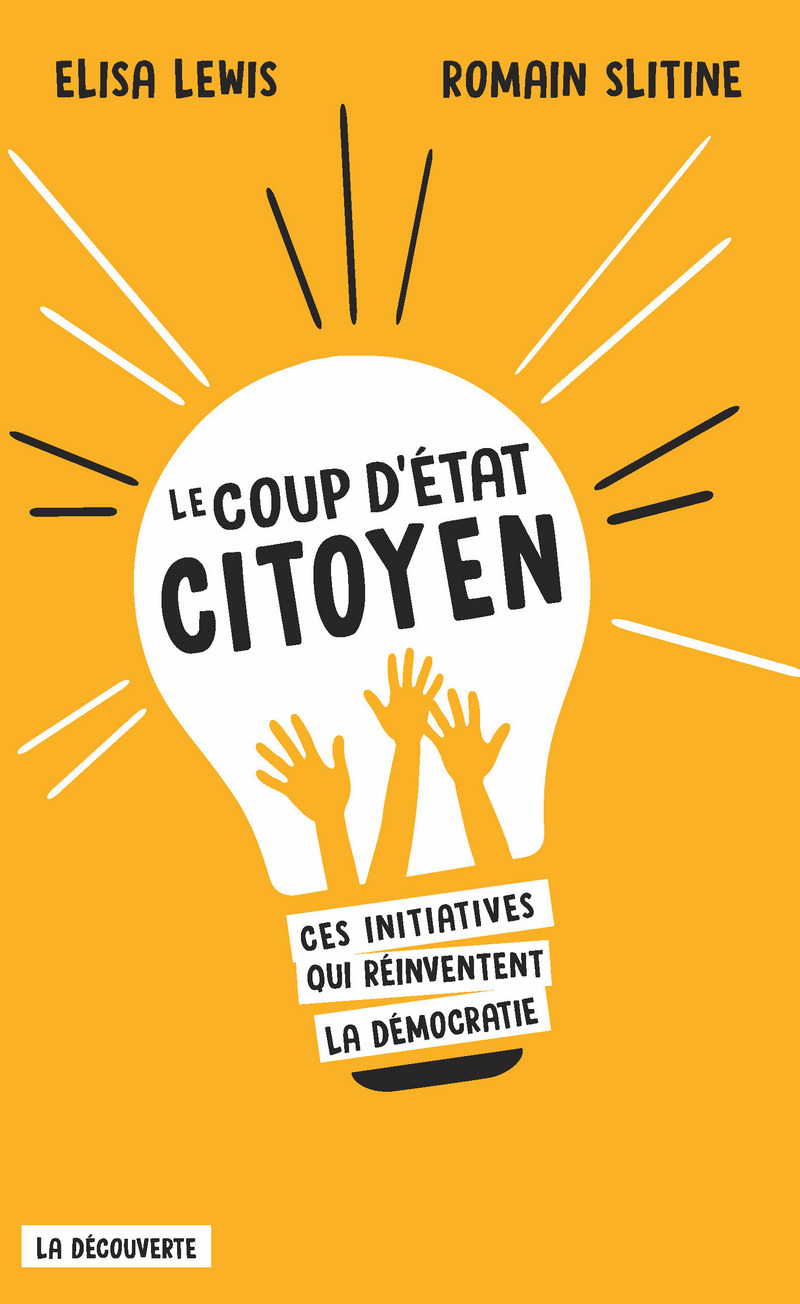Le coup d'État citoyen
Ces initiatives qui réinventent la démocratie
Elisa Lewis, Romain Slitine
Abstention galopante, désertion des partis politiques, impuissance des élus face aux maux de notre société... : longue est la liste des symptômes de notre démocratie malade. Face à ces constats moroses sans cesse répétés, il est urgent d'agir.
Quelles sont les alternatives crédibles pour sortir de l'impasse ?
Pour répondre à cette question, les auteurs ont sillonné la planète pendant près de deux ans et sont allés à la rencontre de quatre-vingts défricheurs qui expérimentent de nouveaux remèdes en dehors des sentiers battus. Les initiatives qui ont fait la preuve de leur efficacité existent : en Islande, des citoyens tirés au sort rédigent eux-mêmes leur Constitution ; en Espagne, des partis politiques " nouvelles générations " redonnent le goût de s'engager ; en Argentine ou en France, des électeurs coécrivent les lois avec les parlementaires sur des plates-formes collaboratives ; un peu partout, des élus inventent de nouvelles manières de gouverner...
À partir de ces expériences inédites, ce livre décrypte la transition démocratique à l'œuvre. Il ouvre des pistes de réflexion pour renouveler notre démocratie et propose des solutions concrètes dont chacun peut se saisir. Et il apporte des raisons d'espérer.

Nb de pages : 173
Dimensions : * cm
ISBN numérique : 9782707192431
 Elisa Lewis
Elisa Lewis

 Romain Slitine
Romain Slitine

 Actualités
Actualités

Extraits presse 

2016-09-14 - Stéphane Alliès - Mediapart
" Ces initiatives sont réalistes, regardez les mouvements spontanés comme le parti Podemos, en Espagne, ou les citoyens tirés au sort qui rédigent la Constitution islandaise. Le lobbying de la société civile, ça marche ! ", affirme Elisa Lewis, membre du collectif Démocratie ouverte et coauteure du " Coup d'État citoyen " (éd. La Découverte).
2016-11-18 - Julia Dion - Elle
Auteurs d'un essai très réussi dédié au Coup d'Etat citoyen (éditions La Découverte, septembre 2016) et aux " initiatives réinventant la démocratie ", ils assurent qu'Internet et l'ère des réseaux rendent possible la participation des citoyens aux décisions politiques, de l'élaboration des programmes au processus législatif.
2016-11-20 - Gaëlle Lebourg - Les Inrocks
Ensemble, ils viennent de publier " Le coup d'État citoyen " (La Découverte, 2016). Les auteurs y passent en revue les initiatives qui, en France ou à l'étranger, entendent " réinventer la démocratie " : du budget participatif aux assemblées tirées au sort, en passant par Podemos, les mouvements dits " citoyens " et les logiciels open source " d'écriture des lois ".
2016-11-26 - Rémi Noyon - L'Obs
Peut-on envisager mieux ? Oui, expliquent Elisa Lewis et Romain Slitine, mais à condition de changer les règles de priorité et les outils : le peuple doit pouvoir poser des questions, et pas seulement donner des réponses.
2017-01-01 - Nicolas Journet - Sciences Humaines
Vidéos 

Le coup d'État citoyen
Table des matières 

Introduction
1 / L'" an I " de la démocratie
La fin d'une ère
" Ils ne nous représentent pas " - Le mythe démocratique - Une crise qui n'en finit plus
Le réveil démocratique
Dépasser les élections - Mettre la démocratie à jour
2 / Des idées et du sang en politique
Podemos : retrouver le goût de la politique
De l'indignation à l'action - De nouveaux espaces d'engagement - Des programmes collaboratifs - Gagner la bataille des idées - Une nouvelle éthique politique
Ouvrir les portes de la politique à tous
L'émergence des " partis citoyens " - La Primaire.org : un candidat indépendant pour l'élection présidentielle - Ma Voix : faire élire des anonymes à l'Assemblée nationale
Changer le logiciel de la représentation
Le Partido de la Red : un cheval de Troie au Parlement - Le Parti Pirate : un parti " poil à gratter " - Une innovation politique radicale : la démocratie liquide
3 / Quand les citoyens font la loi
Prendre l'initiative des lois
La Suisse : pionnière du référendum d'initiative populaire - En Finlande : la plateforme Open Ministry pour démocratiser l'initiative citoyenne
Co-écrire les lois
Democracy OS : le logiciel open source
d'écriture des lois - Parlement & Citoyens : quand élus et citoyens recherchent ensemble les solutions aux problèmes du pays
Retrouver le peuple législateur
Les assemblées législatives de citoyens ordinaires : un retour aux sources de la démocratie - Une Constitution citoyenne 2.0 en Islande - Comment le peuple estonien a changé les règles de la politique - Généraliser les assemblées de citoyens tirées au sort
4. Le contre-lobby citoyen
Lutter pour la transparence
Des médias citoyens - Donner l'alerte - Ouvrir les données
La vigie citoyenne
Contrôler l'action des représentants - Réveiller l'expertise citoyenne - Révéler le lobbying au grand jour
Faire entendre sa voix
Mieux comprendre pour agir - Protester en ligne - Réussir à peser quand on est exclu du système - Le numérique à la rescousse des " sans-voix "
5. (Re)prendre le pouvoir sur son territoire
Décider des orientations de son territoire
Paris : tenir les cordons de la bourse - Grenoble : inventer de nouveaux mécanismes de démocratie locale - Madrid : parier sur le numérique pour gouverner autrement
Saillains : Vivre une expérience démocratique
Les citoyens à l'assaut de la mairie - Une nouvelle pratique du pouvoir - Gouverner en " circuit court "
Devenir contributeur de son territoire
Vers l'administration publique collaborative - Innover au service de l'intérêt général - Gérer les communs
Conclusion : l'espoir démocratique
Notes
Remerciements.












